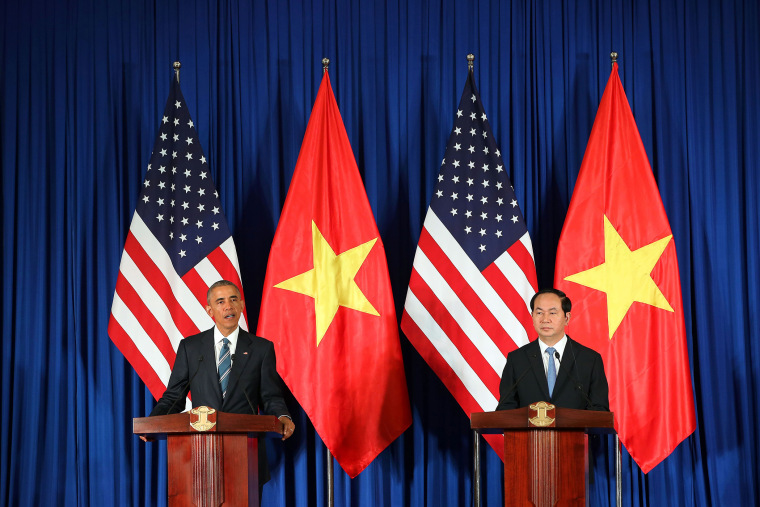It didn't take long for President Obama to make some news after arriving in Vietnam: he announced this morning that his administration is lifting of a longstanding arms embargo against the country.
"The United States is fully lifting the ban on sale of military equipment to Vietnam that's been in place for some 50 years," Obama said. "Sales will need to still meet strict requirements, including those on human rights, but this change ensures Vietnam has access to equipment it needs to defend itself."
The president's trip, however, is about more than military sales. As the New York Times reported, the Obama administration scheduled three days of meeting in the hopes of "luring yet another Southeast Asian country away from China's tight embrace."
Mr. Obama's visit is an important step in a complex dance that Vietnam has carried on with China for centuries. Most of Vietnam's illustrious historical figures made their reputations by battling Chinese invaders. The population here is deeply nationalistic and anti-Chinese sentiment is visceral. The American War, as it is known here, is mostly forgotten, particularly since half of the population is under 30. Vietnam relies on China for trade, investment and even the water that feeds the vast Mekong Delta, so the leadership knows it can poke the dragon only so much.
The Times' report added that China infuriated Vietnam in 2014 by building an oil drilling rig right off the Vietnamese coast, which soon after prompted Vietnam to "step up its contacts with the United States."
Which works just fine for President Obama, who wants to expand access to Vietnamese ports in the short term, while weakening Chinese influence in the long term.
And as we discussed in February, all of this seems to fit nicely into an important pattern.
For Obama, U.S. trade policy should be focused on countering China. U.S. policy in the arctic is about China. U.S. policy in the Caribbean is heavily influenced by China. U.S. policy towards India comes against a backdrop of Chinese interest in the region.
As we discussed last year, it’s hard not to get the impression that Obama sees a race underway for 21st-century primacy, and the president is taking a series of deliberate steps to make sure the United States is well positioned in a competition against China.
It’d be awfully nice to hear some of Obama’s would-be successors share their thoughts on the subject. So far, however, we're stuck with Donald Trump asking in relation to China, "Who the hell cares about a trade war?"
